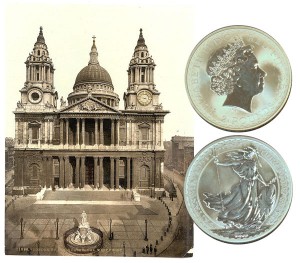Today, with the Power Ball Lottery in the news, the British 2-pound coin remembers the first English lottery of 447 years ago.
In the 1823 book, Collections, Historical and Miscellaneous: and Monthly Literary Journal, the following described the first lottery.
=====
The first English lottery was drawn A. D. 1569. It consisted of forty thousand lots, at ten shillings each lot.
The prizes were plate, and the profits were to go towards repairing the havens of the kingdom.
It was drawn (as Maitland from Stow informs us, vol. I, p. 257) at the west door of St. Paul’s Cathedral.
The drawing began on the 11th of January, 1569, and continued incessantly, day and night, until the 6th of May following. At this time there were only three lottery offices in London.
The proposals of this lottery were published in the years 1567 and 1568.
It was at first intended to have been drawn at the house of Mr. Dericke, her majesty’s servant. (i.e. her jeweler,) but was afterwards drawn as above mentioned.
Dr. Rawlinson showed the Society of Antiquaries, in 1748, a copy of the preceding lottery scheme, and it is thus entitled:
“A proposal for a very rich lottery, general without any blankes; containing a great number of good prizes, as well of ready money as of plate and certain sorts of merchandizes, having been valued and prized by the commandment of the queene’s most excellent majestye’s order, to the intent that such commodities as may chance to arise thereof, after the charges borne, may be converted towards the reparation of the havens, and strength of the realme, and towards such other further good works. The number of lots shall be forty thousand, and no more; and every lott shall be the summe of tenne shillings sterling only and no more. To be filled by the feast of St Bartholomew. The shew of prizes are to be seen in Cheapside, at the sign of the queene’s Armes at the house of Mr. Dericke, goldsmith, servant to the queene. Printed by Henry Bynneman. 1567.”
In 1612, King James, for the special encouragement of the plantation of English colonies in Virginia granted a lottery to be held at the west end of St. Paul’s. One Thomas Sharplys, a tailor of London, had the chief prize, amounting to four thousand crowns in “faire plate.”
In the reign of queen Anne, it was thought necessary to suppress lotteries as nuisances to the public.
=====
To provide some concept of the cost at that first lottery, 10 shillings from 1569 equals roughly 90 pounds in today’s English money per the National Archives of the United Kingdom.
Those 90 pounds are roughly equal to $130 in US currency.
Not quite the same as today’s lotteries — cost, winnings or participation…
The British 2-pound Coin shows against a view of London’s St. Paul’s cathedral, circa 1890.
